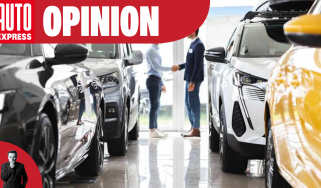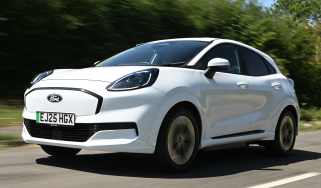HP vs PCP: which car finance format is best for you?
Personal Contract Purchase and Hire Purchase are two of the most common ways of paying for a car. But which is best?

Few of us can walk into a car dealership with a big movie-style briefcase full of crisp banknotes and pay for a car in cash. That’s why car finance packages exist, allowing people to pay for a car in instalments instead, breaking down the ever increasing new car cost into something more manageable.
Two of the most common ways of paying for a car are Hire Purchase (HP) and Personal Contract Purchase (PCP). They look similar on the surface, each usually composed of a deposit (though not always) and then a series of monthly payments, but there are key differences between the two finance options – and that’s where this guide comes in.
Below, we’ve explained what HP and PCP are, how they differ, why you might choose one over another, what you have to look out for, and what each means in terms of car ownership - since that’s the biggest difference between the two options.
What is Hire Purchase (HP)?
Hire Purchase is probably the most traditional form of car finance. Specifically, it takes the amount the car costs, minus any deposit you may have paid, then the remaining amount is paid off over a series of years, and then at the end you own the car outright once the final payment has been made. As such, the name more or less describes the process: it’s a little like hiring a car, until you’ve purchased it…
Pros of HP
HP is one of the most straightforward means of financing a car. If you can afford both the deposit and the monthly payments, then what you see is what you get. These deals are available on new cars and often on used ones as well. They sometimes come with a dealer contribution as a discount on the deposit, and interest rates are fixed, so you’ll know how much you’re paying from the start. Unlike PCP, you won’t be faced with a balloon payment at the end.
Cons of HP
Paying a fixed monthly sum without a balloon payment means the monthly payments themselves tend to be a little more expensive than with PCP (or indeed a lease), so if you’re not set on owning the car outright at the end, you may get a better deal with PCP. You won’t own the car until the final payment has been made either, so the finance company will maintain control over the car until the debt is paid off. HP also isn’t ideal if you like to change cars regularly, as you may be in a finance agreement for several years.
What is Personal Contract Purchase (PCP)?

Personal Contract Purchase or PCP is another way of paying for a car in instalments, but differs from HP primarily by what happens when you’ve reached the end of the payment plan. The deposit and monthly instalments don’t pay for the vehicle in its entirety, unlike with HP, so instead you’ll usually be given three options at the end of the agreed term:
- Pay for the rest of the car in a lump sum, known as a ‘balloon payment’ or Guaranteed Minimum Future Value (GMFV), and become the owner.
- Give the car back and walk away.
- Sell the car to a dealership and use the equity, if any, you’ve built up in the agreement on a new finance agreement on a new car.
Effectively, the initial payment and monthlies on a PCP pay for its depreciation over the term of the deal.
Pros of PCP
One advantage of PCP is that it’s typically cheaper than Hire Purchase, both for the deposit and the monthly payments, since you’re not going to be paying the whole value of the vehicle over the duration of the agreement.
This makes PCP ideal if you want to get into something a little more flash than your budget might cover with HP. If you choose to move onto a new PCP or give the car back at the end of the PCP deal you also don’t have to worry about depreciation or the hassle of selling the car. And if you move from PCP to PCP, you’ll get to enjoy moving to a brand new car every three years or so.
Cons of PCP
As you won’t own the car at the end of a PCP (unless you choose to pay the balloon payment), the terms of a PCP tend to be a little more strict, with agreed mileage limits and charges for damaging the car, more like what you’d get with a lease.
The balloon payment on a PCP can be pretty hefty too, often a lot more than the initial deposit, so if you want to keep the car, you’ll have to scratch together a decent sum of cash or refinance the car.
It’s also worth noting that if you intend to hand the car back at the end of the agreement, you have to let the finance company know a few months before it ends. Failing to do so would result in the company automatically attempting to take the balloon payment at the end of the deal, which could be a nasty shock.
And unlike an HP agreement, PCP tends to only be offered on newer cars, so if you tend to buy older used models, this method of financing may not be available to you.
HP or PCP: what’s the difference?
The biggest difference between Hire Purchase and Personal Contract Purchase is that at the end of the term in HP you automatically own the car, and on a PCP, you don’t. At least, not until you pay the balloon payment.
If you don’t intend to pay the balloon payment, you need to inform the finance company of your intention to hand it back or risk being charged. In HP, you’ll have paid off the car’s full value through the monthly payments.
Cost and contract fees
We can illustrate the difference in cost between HP and PCP with a simple example. Let’s say you’re looking at a car worth £25,000 on Hire Purchase, with a 5% interest rate, 48-month term, and £7,000 deposit. Run those numbers through an HP calculator and you’ll pay just over £413 per month, and have paid £26,853 at the end of the term.
HP car finance example
| Car value | £25,000 |
| Interest rate | 5% |
| Term | 48 months |
| Deposit | £7,000 |
| Monthly payments | £413 |
| Total cost of deal | £26,853 |
With PCP, you might pay a smaller deposit of £4,000, with a balloon payment at the end of the contract which is usually between 30 to 50 per cent of the value of the car.
So in this example we’ll set it at 30 per cent (£7,500). We also set the mileage at 5,000 in this as the lower the mileage, the lower the payment.
With the same 5% APR, your monthly payment would be £310, or around three quarters that of the HP deal, illustrating the monthly saving you can make on the same car – you just won’t own it at the end unless you stump up that £7,500 at the end.
PCP finance example
| Car value | £25,000 |
| Interest rate | 5% |
| Term | 48 months |
| Deposit | £4,000 |
| Annual mileage | 5,000 miles |
| Total amount financed (not including interest) | £13,500 |
| Monthly payments | £310 |
| Balloon payment set at 30 per cent | £7,500 |
| Total cost of deal | £26,380 |
Mileage limits
An HP agreement won’t have a mileage limit because provided you make all the payments, the finance company effectively doesn’t really care what the car is like once you’ve paid it off. A PCP finance provider does though, so you’ll probably be restricted to a certain mileage each year, and have to pay a fee if you go over this.
Car maintenance
On both HP and PCP, you’ll be responsible for maintaining your car. Though as with the mileage limits above, a finance company will be more particular about where and how you get the vehicle serviced on a PCP deal since they might be taking it back at the end, and a poorly-maintained (or damaged) vehicle will be worth less and affect their depreciation calculations. That said, even if you’re buying a car on HP, it’s in your best interest to get it serviced on schedule.
Car ownership at the end of the deal
At the end of an HP deal, you own the car – it’s as simple as that. At the end of the monthly payments on a PCP deal, you won’t own it until you make the balloon payment.
As is implied with the ‘Purchase’ in the Personal Contract Purchase, the automatic situation at the end of these finance agreements is that you pay the balloon payment. The finance company will attempt to take your balloon payment unless you inform them of your intention to hand the car back.
Is HP or PCP better?
Whether one is better than the other is really down to personal preference. If you want the reassurance of knowing you own the car at the end of the finance term, and intend to keep the car afterwards without caring too much about depreciation, then Hire Purchase is the one for you. If you like changing your car more regularly and want smaller monthly payments, then PCP is the better option.
Frequently Asked Questions
HP is more expensive because you’re paying for the full value of the car during the duration of the finance agreement, rather than just a proportion of it to cover the car’s depreciation.
Did you know you can sell your car with Auto Express? Get the highest bid from our network of over 5,500 dealers and we'll do the rest. Click here to try Auto Express Sell My Car now...
Find a car with the experts









